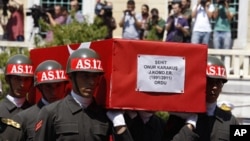In Turkey the bodies of the eight Turkish soldiers killed by the Kurdish rebel group the PKK are being returned to their home towns. The deaths have caused both public and political outrage in Turkey. Turkish armed forces have bombed PKK bases in neighboring northern Iraq and the government is under mounting pressure to take a tougher stance against the rebels.
Hundreds of people protested in Istanbul throughout the night against the killings of eight Turkish soldiers by the Kurdish rebel group the PKK. One of city's major highways was blocked by the protestors, waving Turkish flags and chanting anti-PKK slogans.
At the same time, the Turkish air force, backed by artillery, bombed Kurdish rebel bases in Northern Iraq. With 34 soldiers killed in the past few weeks, Prime Minister Recep Tayyip Erdogan is under mounting pressure to crackdown on the PKK.
The prime minister has been critical of the army over its handling of the insurgency and is expected to accelerate the planned use of police in combating the rebels. But retired brigadier Haldun Solmazturk says thatis proving extremely controversial.
"It is a stupid idea. Anyone who has any idea what the army is about, what the police is about, what anti-terror operations mean out of the city, would never entertain such an idea," said Solmazturk. "I hope advisers explain to him the difference between an army and a police force."
The controversial measure is reported to have been discussed at a meeting of Turkey's National Security Council, where senior ministers meet with the head's of the army forces. The armed forces say further strikes against iraq are also planned, but analysts say both measures are expected to have at best only limited effect on combating the insurgency.
A PKK statement said the air strikes were expected and they have had years of experience in dealing with them. The measures are being seen as more to do with quelling the growing Turkish public anger.
Journalist Metehan Demir of the Turkish daily Hurriyet says Mr. Erdogan's increasing tough rhetoric against the PKK should be carefully examined.
"If you look at carefully what he says, out of 10 sentences , six sentences are very tough. But if you look at the other four sentences, they are little bit calmer and a little warmer to the other side," said Metehan.
The Prime Minister has made resolving the 27-year conflict with the PKK a key priority.
For the past few months Turkish officials have conducted talks with imprisoned PKK leader Abdullah Ocalan and a planned new constitution is also seen as an opportunity to meet Kurdish rights demands.
But Parliament Speaker Cemil Cicek refused to meet with the leaders of the pro-Kurdish BDP during meeting Thursday with parliament party leaders to discuss the new constitution.
Cicek cited the ongoing BDP parliament boycott as his reason. The BDP is boycotting parliament because of the imprisonment of one of their colleagues.
But observers say Cicek's exclusion of the BDP has much to do with Wednesdays killings. Earlier this week. Mr. Erdogan accused the party of being complicit in the deaths of soldiers, because of its failure to denounce the PKK.
Those who do not distance themselves from the terrorist organization are partners in the crime," Erdoğan said. Those who cast a shadow on peace in Turkey and shed blood will pay the price for their actions, and the payment will be heavy he added.
But Parliament deputy for the pro-Kurdish BDP, Ertugral Kurkcu, says the military action and the tough rhetoric should be seen in a wider context.
"It is a downward process, but I hope it will get better, because [the] Tayyip Erdogan government is now trying to see if they can reduce the power of the PKK in military and political terms, before sitting down on a table for peace negotiations, this is why the violence is escalating," said Kurkcu.
Kurkcu says the BDP will probably end the parliament boycott when it returns October 1st and will participate in the new constitution process.
Turkey Retaliates for Deadly Rebel-Kurd Attack




